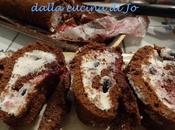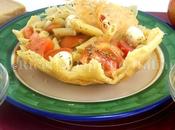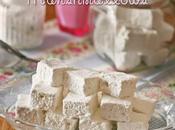 English Version Below
English Version BelowIn quest'ultimo scorcio di giugno mi son fatta prendere dalla pigrizia. Succede sempre quando arriva il caldo, c'è meno voglia di cucinare, si esce di più, si ricorre alla certezza dell'insalatona o della pasta col pomodoro fresco, se proprio proprio la serata è propizia un bel risottino con le verdure fresche di stagione, io lo adoro con zucchini e fiori di zucca, pochi pistilli di zafferano per dargli un tocco di colore. La voglia di cucinare un po' si affievolisce e imperversa la smania dell'assemblaggio. Spiedini di frutta o verdure fresche, carni che richiedono cotture veloci e piatti di formaggi e verdure crude. A fine giugno però abbiamo festeggiato il compleanno di Andrea e ho deciso di mettermi ai fornelli per fare una delle cose che mi piacciono di più e che per me sono il simbolo ufficiale dell'estate: la pasta fritta!Presente in tutte le sagre di paese delle mie parti la pasta fritta ha il profumo delle prime scorribande serali, della fine dell'anno scolastico, delle sere al ritorno dal mare. Mi piace tantissimo ma non l'avevo mai fatta. Andrea aveva assaggiato quella delle sagre ma dopo aver provato la mia ha detto che non c'è confronto, sarà che mi ha aiutato a prepararla, sarà che vederla mentre si gonfia e cambia colore mentre danza nell'olio bollente te la fa apprezzare di più, il fatto è che era veramente buona. Qui nel mantovano la pasta fritta non è conosciuta e così è stata una gustosa sorpresa per gli amici che con noi hanno condiviso una bella serata di festa. Ho deciso di prepararla partendo da una base di pasta madre, la lunga lievitazione ha reso l'impasto soffice e digeribilissimo, la frittura veloce ci ha regalato una pasta croccante e dorata all'esterno e morbida all'interno. A contatto con l'olio la pasta si gonfia e dopo pochi minuti di cottura si scola ed è pronta per essere gustata accompagnata da salumi e formaggi freschi. La morte sua è la mortadella. Ho evitato di salarla in superficie dopo la frittura, come vuole la tradizione, perché servendola con gli affettati sarebbe stata troppo saporita. Certo se viene mangiata da sola una bella spolverata di sale ci sta proprio bene.
Per controbilanciare questa preparazione non proprio leggerissima ho servito piccole capresi su spiedini di bambù e verdure crude da gustare in pinzimonio.
La pasta fritta ha passato il test e diventerà uno dei cavalli di battaglia da presentare almeno una volta durante l'estate.
Queste dosi sono per circa 35-40 pezzi di pasta fritta.
- 150 g pasta madre
- 300 ml acqua a temperatura ambiente
- 450-500 g farina 00
- 3 cucchiai d'olio extravergine d'oliva
- 2 cucchiaini di sale marino fine
- 1 l di olio di semi per friggere
Come to end of June I am enveloped in laziness. It always happens when it's hot, we cook less, go out more, we surrender to the appeal for mixed salad lunches, or seek the refreshing taste of pasta with fresh tomatoes, if you’re inspired you can cook a beautiful risotto with fresh seasonal vegetables. I love it with zucchini and zucchini flowers, and I add a few saffron strands to give it a touch of colour.The desire to cook fades away and we fall for the food assembly game. Here come fresh fruit or mixed vegetables skewers, thinly sliced meats that require fast cooking and cheese platters with raw vegetables.
In late June, however, we celebrated Andrea’s birthday and I decided to get in the kitchen to make one of the thing I like most and which for me is the official symbol of summer: fried bread dough!
You can find it in every country fair in Tuscany, this fried dough has the scent of the first nights out, it reminds my of school holidays and of the evening coming home from a day spent at the seaside.
I love it but I had never made it before. Andrea had tasted the country fair one, but after trying mine he said that there is no comparison, mine was way better. Maybe because he helped me to prepare it, maybe because he saw it swell and change colour while dancing in hot oil, maybe all these things made him appreciate it more, the actual fact though is that fried bread dough is really delicious. Here in Mantua this fried dough is not known and so it was a tasty surprise for the friends who shared with us a wonderful birthday party.
I decided to prepare my fried bread dough starting from sourdough, the long leavening made the dough soft and very digestible, the frying process gave us a dough that was crisp and golden on the outside and soft on the inside. When submerged in hot oil the dough swells and after a few minutes of cooking is ready to be enjoyed accompanied by cold cuts and soft cheeses like stracchino, brie, gorgonzola or other blue cheeses. The best pairing is mortadella. I did not sprinkle it with salt after frying it, as per tradition, because I served it with cold cuts and a salted dough would have been too tasty. Of course if it is eaten on its own a good sprinkling of salt really makes it delicious.
To counterbalance this fantastic but not lightweight dish, I prepared some small Capresi on bamboo skewers – cherry tomatoes, cherry mozzarella and basil leaves, and I also prepared some platters full of raw vegetables sticks with vinaigrette.
The fried dough has passed the test and has become one of our favourite dishes to be presented at least once during the summer.
These doses are approximately 35-40 pieces of fried dough
- 150 g sourdough
- 300 ml water at room temperature
- 450-500 g all-purpose flour or 00 flour
- 3 tablespoons of extra virgin olive oil
- 2 teaspoons fine sea salt
- 1 litre of vegetable oil for frying
 La mattina mettete la pasta madre in una ciotola capiente e scioglietela nell'acqua a temperatura ambiente. Aggiungete 200 g circa della farina e mescolate bene per incorporare poi lasciate riposare per circa 20 minuti. Passato questo tempo aggiungete 250 g della restante farina, il sale, 2 cucchiai di olio extravergine e impastate fino a che tutti gli ingredienti sono stati incorporati. Continuate a lavorare la pasta per 10 minuti fino a che l'impasto sarà liscio ed elastico e si staccherà dai bordi della ciotola dell'impastatrice. Aggiungete altra farina se necessario. Volendo potete lavorare la pasta di pane anche a mano. Ungete una ciotola con il rimanente olio d'oliva e metteteci la vostra pasta coperta con della pellicola trasparente e un canovaccio da cucina. Fate lievitare in un luogo caldo e al riparo dalle correnti d'aria fino a che l'impasto è ben gonfio. Ci vorranno dalle 6 alle 8 ore.
La mattina mettete la pasta madre in una ciotola capiente e scioglietela nell'acqua a temperatura ambiente. Aggiungete 200 g circa della farina e mescolate bene per incorporare poi lasciate riposare per circa 20 minuti. Passato questo tempo aggiungete 250 g della restante farina, il sale, 2 cucchiai di olio extravergine e impastate fino a che tutti gli ingredienti sono stati incorporati. Continuate a lavorare la pasta per 10 minuti fino a che l'impasto sarà liscio ed elastico e si staccherà dai bordi della ciotola dell'impastatrice. Aggiungete altra farina se necessario. Volendo potete lavorare la pasta di pane anche a mano. Ungete una ciotola con il rimanente olio d'oliva e metteteci la vostra pasta coperta con della pellicola trasparente e un canovaccio da cucina. Fate lievitare in un luogo caldo e al riparo dalle correnti d'aria fino a che l'impasto è ben gonfio. Ci vorranno dalle 6 alle 8 ore.In the morning, put the dough in the mixer bowl and stir in the water. Add 200 g of flour and stir well to incorporate then let it sit for about 20 minutes. After this time, add 250 g of the remaining flour, salt, 2 tablespoons of extra virgin olive oil and turn on the mixer until all the ingredients have been incorporated. Let the mixer knead the dough for 10 minutes until it is smooth and elastic and comes away from the sides of bowl. Add more flour if necessary. You can knead by hand if you wish so. Grease a bowl with the remaining olive oil and put your dough in it, cover with cling film and a kitchen towel. Let rise in a warm place, away from drafts until the dough has at least doubled in size. It will take 6 to 8 hours

Passato questo tempo infarinate la spianatoia e stendete l'impasto con il mattarello fino a ottenere un rettangolo di circa 1/2 cm di spessore. Se stendete la pasta più sottile al momento della cottura la pasta si gonfierà e otterrete della pasta fritta vuota all'interno e croccante all'esterno. Quando siete pronti per friggere scaldate l'olio in una padella capiente, io ho usato il mio wok. Per sapere se l'olio ha raggiunto la temperatura ottimale immergeteci la punta di uno spiedino di legno, se l'olio inizia a sfrigolare intorno allo spiedino vuol dire che è pronto. Con un coltello affilato o una rotella per la pizza tagliate l'impasto in strisce di circa 4-5 cm poi fate dei tagli diagonali su ogni striscia di pasta per ottenere dei rombi, friggete la pasta per qualche minuto rigirandola in modo che si colori da entrambe le parti, scolate su carta assorbente. Via via che era pronta ho messo la mia pasta fritta nel forno a 65°C in modo da poterla servire tutta ben calda.
After the dough has leavened flour the working surface and roll out the dough with a rolling pin until you have a rectangle about 1/2 cm thick. If you roll the dough thinner than that, when fried the dough will swell a lot and you will get a crisp hollow fried dough. When you are ready for frying heat the oil in a large skillet, I used my wok. To find out if the oil has reached the optimum temperature dip the tip of a wooden skewer in it, if the oil begins to sizzle around the skewer it means that it is ready. With a sharp knife or a pizza wheel cut dough into 4-5 cm strips then make some diagonal cuts on each strip of dough to obtain diamond shapes, fry the dough for a few minutes turning it over so that it colours evenly then drain on kitchen paper. As soon as it was ready I put my fried dough in the oven at 65° C until all the dough was cooked.







